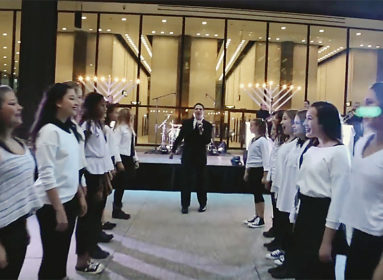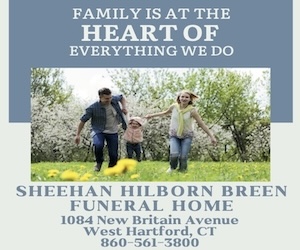Challenged but not excluded from synagogue life
By Cindy Mindell
WEST HARTFORD – For those who have always wanted to chant haftarah from a synagogue bimah but lack the confidence, it’s time to meet Rayna Segelman.
The 33-year-old West Hartford resident has battled physical and learning disabilities since suffering a stroke at age three.
On Aug. 23, after two years of dogged study and perseverance, Segelman realized a longtime dream on the bimah of Beth El Temple in West Hartford, where she is a member.
“It always bothered me that, from the time of my bat mitzvah, I had forgotten how to read Hebrew,” Segelman says. “I wanted to learn again but it was never the right circumstance or time and it didn’t come about.”
That is, until 2012, when Segelman was introduced to Barbara Checknoff, a fellow congregant and a teacher at Beth El’s religious school. The two met at a Shabbat kiddush and Checknoff offered Seligman, who no longer drives, a ride home.
“Rayna said that she’d forgotten how to read Hebrew and couldn’t keep up with a class,” Checknoff recalls. “I offered to help, to come to her house after services.”
The pair started out with the basics – letters and sounds – “and it came back pretty quickly,” Segelman says. Then Checknoff asked whether Segelman would like to learn a haftarah. “I said, ‘I would love that,’” Segelman says. “This was a challenge I was completely up to and wanted so much.”
Checknoff identified the two shortest parashot and Segelman chose Re’eh because it fell during the summer, an easier time for Segelman to get around. Cantor Joseph Ness of Beth El recorded the parasha and the tutor and student got to work, with the text printed in extra-large font to accommodate Segelman’s compromised vision. By winter 2012, Segelman was committed to learning the 12 lines and accompanying blessings.
It wasn’t so much the trope – Segelman has been singing since age five – but the words that proved most challenging. “One of the reasons why I decided to do the haftarah instead of the Torah is because, with the Torah, you have to memorize words without the vowels and I can’t memorize very well anymore,” Segelman says. “My memory was the hardest aspect of learning, so we had to go over and over it.”
The two women also became good friends. “In my personal life, I was having a lot of difficulties and one of the things that really helped me was to know that Barbara was coming for our session,” Segelman says.
There was a lot more preparation for the event beyond learning the haftarah. Segelman wanted to be involved in as many aspects of her upcoming haftorah reading as possible – from sewing an outfit and learning how to make a kippah from Kids Kippot owner Elizabeth Ehrlich, to creating a tallit and hand-tying the tzitzit, helped by Checknoff’s daughter, Hadassah.
These tasks were even more challenging for Seligman, who only has full use of one hand, but has learned how to use a sewing machine and make beaded jewelry.
“I was 17 before I tied my first shoe, so things don’t always come easily to me but I worked and worked,” she says. “It wasn’t another bat mitzvah, but a natural progression of my life.” Checknoff and Segelman’s mother, along with several other congregants, prepared the festive luncheon. “It was a real community effort and a lot of people came together to celebrate it,” Checknoff says.
On Shabbat Re’eh, Segelman and Checknoff took the bimah together, with the tutor standing by her student and prompting her or chanting difficult parts when necessary. Segelman had to sit down before reciting the blessings. It was slow going but “it was very comforting because Barbara was right next to me and that gave me a lot of ease in doing it,” Segelman says.
After the final “Amen,” Segelman got up to walk over to Rabbi James Rosen. “He told me to look at the congregation and everyone was on their feet,” she says. “Then they started clapping – not ‘Shabbat clapping’ [rubbing palms together] but real clapping. I found out later that the rabbi was the one who had encouraged that.”
It was a Shabbat of multiple celebrations, complete with a baby-naming and the 104th birthday of a congregant.
Segelman is now on a roll. “Working with Barbara and doing this was one of the greatest achievements of my life,” she says. “Barbara is an amazing teacher. I will keep working with her – now I want to learn Birkat Hamazon.”
Not surprisingly, Segelman is a motivational speaker whose mantra is “there’s always a way, no matter what.”
“I am a firm believer in thinking outside the box, and I truly believe that I would not be where I am today if I didn’t,” she says. “I knew a blind woman who had a bat mitzvah and she figured out how to do it, with Braille. I know twins who had b’nai mitzvah – one has cerebral palsy and the other doesn’t – and they figured it out. So many people in my life told me that I couldn’t drive but I got a license and drove until my vision got worse. They told me that I would never go to college and I got an associate’s degree and graduated magna cum laude.”
For Segelman, reality is all about perception. “In life, there are obstacles but it’s how you perceive those obstacles that makes the difference,” she says. “You have to decide: is it a real barrier or is there a way to get around it?”
Comments? email cindym@jewishledger.com.
Interfaith workshop focuses on opening places of worship to those with special needs
On Sunday, Oct. 19, from 1- 3 p.m., Beth El Temple in West Hartford will host the first-ever interfaith presentation and conversation on the topic of welcoming those with special needs in our synagogues, churches, and mosques. The two-hour interactive workshop will feature Tracy Stackhouse, MA, OTR, and Sarah “Mouse” Scharfenaker, MA, CCC-SLP, of Developmental FX: Therapy That Fits, who are leading experts on children with developmental and sensory needs.
The workshop is geared toward clergy, educators, parents, friends, members of faith-based communities, and anyone who knows and loves someone with special needs. The workshop will focus on sensory hyperarousal and its impact on behavior.
The workshop is free and open to the public. Beth El Temple is located at 2626 Albany Ave., West Hartford. For more information, call (860) 233-9696.








 Southern New England Jewish Ledger
Southern New England Jewish Ledger









